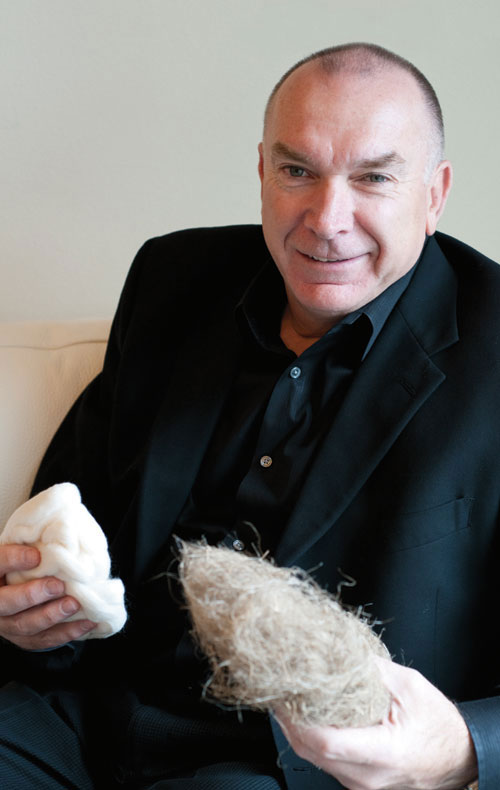 Naturally Advanced Technologies uses enzyme technology on flax to make a patented material softer than linen and cheaper than cotton.
Naturally Advanced Technologies uses enzyme technology on flax to make a patented material softer than linen and cheaper than cotton.
 |
Barker’s company will remain Canadian but will be run out of Portland by a small but growing team with experience at Nike, Under Armour and Adidas. // Photo by Teresa Meier |
Midway between signing a 10-year purchasing agreement with Hanesbrands and closing a development deal with Levi’s, a very pumped up and busy Ken Barker stopped into a downtown café recently to talk flax.
During the previous chapter of Barker’s career he was head of apparel of Adidas North America in Portland. Now he is CEO of Naturally Advanced Technologies, a small company with global aspirations. When Barker first got involved in NAT as an investor it was a hemp company based in Vancouver, B.C., using enzymes to break down fibers into fine strands. Now it is using the same technology on flax to make a patented material softer than linen and cheaper than cotton.
That’s right — cheaper than cotton. A spike in cotton prices has propelled Barker’s small company into a strong position. The deal between NAT and Hanesbrands brought coverage from the Wall Street Journal and Marketplace radio and sent stocks soaring for both businesses.
“We are talking to leaders in denim, sportswear, bed and bath, disposable drapes, and gowns for the medical industry,” Barker said. “There isn’t a category out there we’re not engaged in. Because everyone is faced with the same dilemma” of rising cotton prices.
Barker expects to produce 400,000 pounds of CRAiLAR flax per week at facilities in South Carolina and Manitoba, Canada, by the end of 2011. His plan involves growing flax in South Carolina, buying it from farmers in North Dakota and potentially planting new crops in the Willamette Valley. Barker’s strategy is to build CRAiLAR into a brand as ubiquitous as Lycra or Gore-Tex, and to introduce it into a global system he knows well.
“The supply chain for us to ship fiber into manufacturing regions around the world exists currently,” he said. “All the major brands we’re working with are saying, fine, ship it to Karachi, ship it to India, ship it to China. It’s exactly the same process.”


